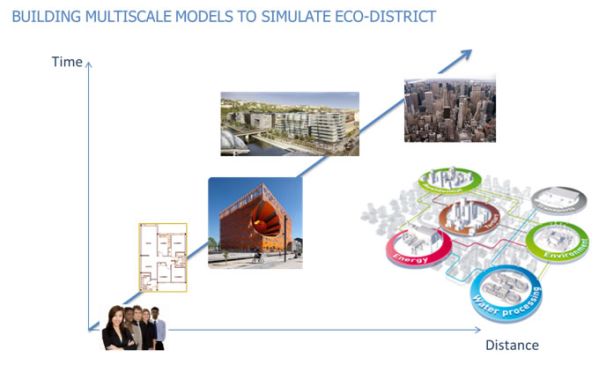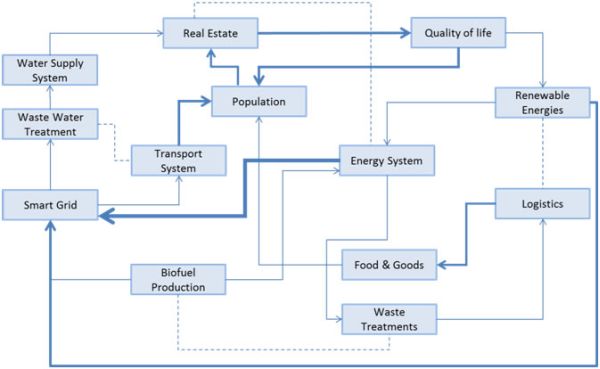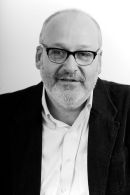Modélisation et simulation des systèmes complexes / Complex systems modeling and simulation
Michel MORVAN
Président et co-fondateur de The Cosmo Company
Abstract : The modelling tools developed by physicists, mathematicians, computer and social scientists to analyse, interpret and visualize complex data sets can effectively address the challenges of our era. But the theoretical investigation of such models often presents non-trivial challenges due to the intrinsic discreteness of the interactions, the complexity of the interactions, their non-stationarity as well as the difficulties of modelling individuals’ behaviour with few degrees of freedom. It is currently necessary to (a) model each part of a system using the correct, specific formalism for that part, to (b) interconnect the parts with potentially different kinds of interactions, and to (c) define, if necessary, the right time scale for each part. To achieve that, one currently has two options:
- Using a modelling tool specialized in a specific kind of modelling (e.g agent-based or partial differential equation modelling) that is suitable for part of the system but not for everything. In this case, one has to squeeze – or simplify – the unadapted parts to fit the given formalism, which reduces the model's relevance and accuracy.
- Using a multi-formalism tool that allows the use of one of its predefined formalisms.
This approach considers that all the parts of the system can be suitably modelled with one of the formalisms offered.
But this is not enough if, for example, heterogeneous hierarchies need to be modelled. Current software platforms allows to develop models to extrapolate (multi-)linearly from equilibria representing the present. To describe and simulate cities, it is necessary to use a complex systems approach, which allows for the coupling of heterogeneous models and the description of cross-scale interactions and treats multi-parameter optimization at all scales to take the dynamics of the changing city environment into account.


 |
Biography : Michel MORVAN
Before becoming the chairman of The CoSMo Company, Michel Morvan has been from January 2009 to February 2013 the Chief Scientist and Vice President for Strategic Intelligence and Innovation at Veolia Environment. There, he was responsible for all innovation activities, including the Veolia Innovation Accelerator, as well as other corporate strategic initiatives as the 4CT sustainable cities project. He is also a former Full Professor of Computer Science at École normale supérieure de Lyon, a former Senior Scientist (directeur d’études) at Écoles des hautes etudes en sciences sociales in Paris (chair “Complex Systems Modelling”) and was until June 2013 External Professor at the Santa Fe Institute (New Mexico, USA). Michel is also the founder and former head of IXXI (Rhône Alpes Complex Systems Institute), the co-founder of the European Conference on Complex Systems as well as the first chair of the steering committee of this conference. He is a former member of the Institut universitaire de France, as well as an Eisenhower Fellow and IHEE alumni.
|
| Michel Morvan est le président et co-fondateur de The Cosmo Company, une start-up d’édition de logiciels et de services, qui est spécialisée dans la modélisation des systèmes complexes. Il a été Professeur d'informatique à l'École normale supérieure de Lyon, et directeur d'études à l’Écoles des Hautes Etudes en Sciences Sociales à Paris (chaire de modélisation des systèmes complexes). Jusqu'en Juin 2013 il était aussi professeur au Santa Fe Institute (Nouveau-Mexique, Etats-Unis). De Janvier 2009 à Février 2013, il était vice-président pour le renseignement stratégique et l'innovation et Directeur Scientifique de Veolia Environnement. Là, il était responsable de toutes les activités d'innovation, ainsi que d'autres initiatives stratégiques de l'entreprise tel que le projet des villes durables 4CT. Michel est également le fondateur et ancien directeur de l’IXXI (l’Institut des Systèmes Complexes de Rhône Alpes), le co-fondateur de la Conférence européenne sur les systèmes complexes ainsi que le premier président du comité de direction de cette conférence. Il a été membre de l'Institut Universitaire de France, Eisenhower Fellow, c’est aussi un ancien de l’IHEE. |
|


![]() La participation à cet atelier est gratuite sous réserve des places disponibles
La participation à cet atelier est gratuite sous réserve des places disponibles![]() L'enregistrement en ligne est obligatoire pour y assister. Cliquer ICI pour vous inscrire.
L'enregistrement en ligne est obligatoire pour y assister. Cliquer ICI pour vous inscrire. 
